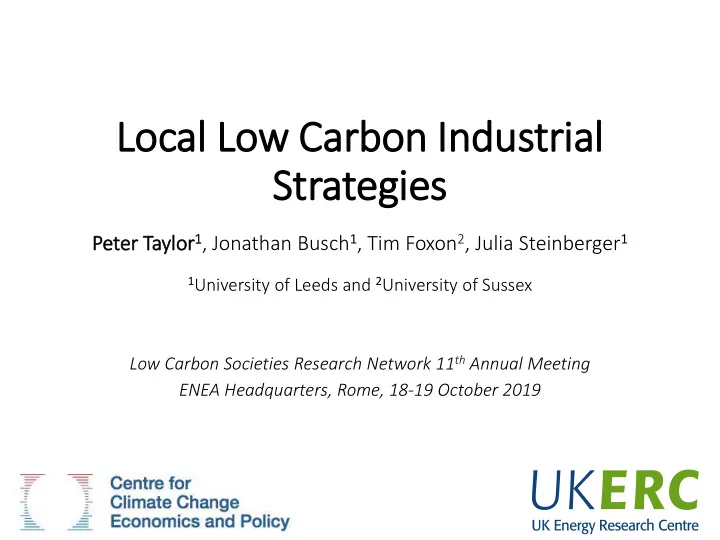

Local Low Car Carbon I Industrial Strateg egies es Taylor 1 , Jonathan Busch 1 , Tim Foxon 2 , Julia Steinberger 1 Pet eter er Ta 1 University of Leeds and 2 University of Sussex Low Carbon Societies Research Network 11 th Annual Meeting ENEA Headquarters, Rome, 18-19 October 2019
1 Context & Motivation 2 Research Process 3 Results 4 Next Questions
1 Context & Motivation • Clean Growth Strategy (October 2017) • Industrial Strategy (November 2017) • Amendment to Climate Change Act for a net-zero target (June 2019) “ I want to … underline the enormous industrial opportunity for us that is emerging from the global transition to a low carbon economy - and how it will benefit us right across the UK. ” - Claire Perry, Minister of State for Energy and Clean Growth, 2017 “ a new approach to government … stepping up to a new, active role that backs business and ensures more people in all corners of the country share in the benefits of its success ” - HM Government, 2017
2 Research Process 1. Theoretical Framing Ecological Economics + neo-Schumpeterian Economics Busch J, Foxon TJ, Taylor PG. 2018. Designing industrial strategy for a low carbon transformation. Environmental Innovation and Societal Transitions. 29 , pp. 114-125
2 Research Process • Case studies Interviews with stakeholders in Humber region and Styria • Knowledge exchange Workshop between practitioners in Humber region and Styria • Policy co-creation • Secondment to the West Yorkshire Combined Authority
3 Results 1 Strategic objectives for low carbon industrial strategies • Promote innovation in low carbon technologies, business models and practices • Action to manage energy demand as well as supply • Enable flexibility for systemic change
3 Results 2 Five elements for designing policy • Defining and enabling low carbon industrial missions • Creating markets with demand-pull • Shaping markets by identifying opportunities and rewarding success • Stimulating investment • Embedding learning approaches in governance
3 Results 3 Low-carbon industrial development does not decarbonise industry • Policy is focused on industrial development • The Climate Emergency also requires sunsetting strategies • Just Transition – vested interests mobilise dependent communities
3 Results 4 Intermediary Organisations • Important functions for innovation ecosystems • New: formal cluster organisations and climate commissions • Existing: re-orienting from ‘declining’ industries • No evidence of sunsetting functions
4 Next Questions Does the reorienting of intermediaries away 1 from fossil industries contribute to sunsetting? • Undermining social licence & political influence? • Providing routes for Just (job-to-job) Transitions? Do climate intermediaries have the needed 2 transformational potential? • Partners are often anchor institutions • Reflexive ‘radicalisation’ of institutions?
T ha nk Yo u!
Recommend
More recommend